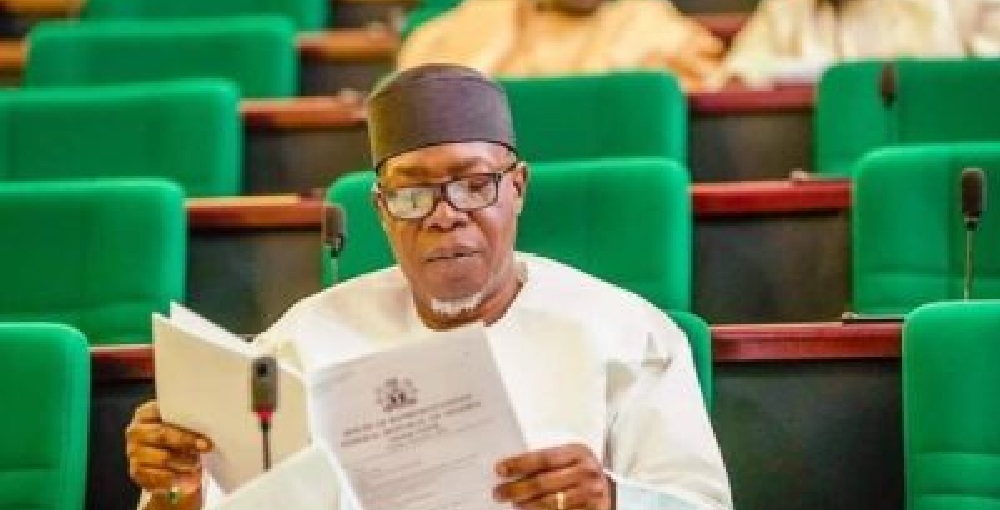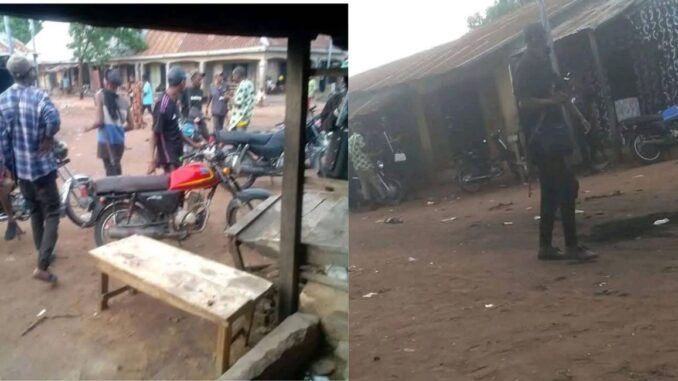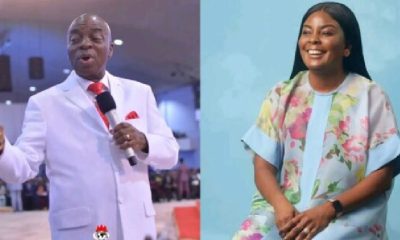News
Hail Nigeria! Where National Anthem Is Priority Over People

Ordinarily, Honourable Julius Ihonvbere, OON, Majority Leader, Nigeria’s House of Representatives, the man at the centre of the imbroglio over a “new national anthem”, should bear no lengthy introduction. But bear the ordinariness that the esteemed professor of politics has lowered himself to, for whatever reason.
A disagreement emerged Thursday on the floor of the House over the anthem that suited Nigeria better. Some wanted the current one, which rounds off its first stanza with this lie, “to serve with heart and mind, one nation bound in freedom, peace and unity”.
The old anthem that starts with, “Nigeria we hail thee, our dear native land, though tribe and may differ, in brotherhood we stand,” another lie, was the choice of others, who thought that the national song the British bequeathed was better. They were opposed by those who said a return to the 1960 anthem meant a preference for colonialism over our own 1978 home-made anthem.
Prof Ihonvbere, described on his website as, “A thinker of fresh ideas and a consistent community builder. An astute leader with a deep-seated passion to serve his people (Owan Federal Constituency, Edo State,” was the one who led the fast-forwarded bill for a new anthem.
The above description understates Ihonvbere, a political science scholar who taught in universities at home and abroad. He was an activist in the pro-democracy struggles under the military, fired his students out of intellectual laziness, and led ASUU, the university teachers’ group on protests over their conditions that have worsened since then.
He was a Special Adviser on Projects Monitoring when Olusegun Obasanjo was president. The ordinariness that has overtaken him as he makes the best of his political high office would worry those who knew him as a Democrat committed to politics that would elevate the well-being of his people.
Many voices were not allowed to contribute to the anthem debate as the furious drive to get the job done continued.
Their point was the bill was not on the day’s list of business. Some wondered why an anthem was so important.
Ihonvbere sponsored the bill that went through its first, second, and third readings on the same day. The bill was passed on the same day – a public hearing was not necessary.
“I believe that the old anthem, encompasses, contains, exudes the kind of energy, resourcefulness and a sense of vision that I believe is good for Nigeria,” Ihonvbere said.
He deserves applause from the quarters his Thursday’s enterprise served.
The Senate could apply more speed to pass it on Tuesday, on time for it to be used for Wednesday’s first anniversary of the Bola Ahmed Tinubu administration.
Why is a new anthem so important in a country where millions are dying from hunger? Why would legislators be so passionate about a bill that would not create jobs, solve security challenges, enhance the chances that businesses would survive or improve infrastructure?
President Tinubu gets what he wants. He does not have to explain anything to anyone. The hurry to get the old anthem back now appears to be a condition for the safety of Nigerians, as if our security agencies would not fight enemies any longer until they get an anthem that inspires them.
Tinubu’s acolytes would also count this distraction as another example of how strategic and long-term planner their boss is. Tinubu hinted at his dislike of the old anthem 13 years ago.
“Abandoning the post-independence anthem, which arguably evoked a strong spirit of patriotism and brotherliness, to compose a very drab replacement, is far less inspirational,” Tinubu said during a 2011 speech at the Nigerian Institute of Policy and Strategic Studies, NIPSS, Kuru, Jos.
Do you still ask why the killings in Plateau, Benue, Kebbi, and other parts of Nigeria get less attention than a national anthem? Why do we care more about meaningless words, made more meaningless by our leaders and their officials?
How many of our leaders stand in “brotherhood”? They can be counted in one hand with several fingers left. Are they not beneficiaries of “tribe and tongue” that differ? So, it is the current anthem that is responsible for the “labours of our heroes past” that are “in vain”? Should we agree that the revert to “Nigeria, we hail thee” will help us achieve “one nation bound in freedom, peace and unity”?
Nobody has considered the billions of Naira the project will consume. Rather, in fairness to the proponents of this major project, the importance of which is reflected in its speed through the National Assembly, the beneficiaries of this particular waste are waiting for their share of Nigeria’s shrinking resources.
The money that is about to be wasted could have been borrowed for priority projects. A new national anthem is a priority where uncertainty is the new order, where people feel so excluded from opportunities that their understanding of a nation deflates daily.
An old, new national anthem is one more charade that defines us as a country that delights in promoting nothingness to pronounced nothingness.
Whether we sing, “Arise, O compatriots”, or “Nigeria, we hail thee”, the verdict sounds like, “Nigeria, we hate thee”.
ELSEWHERE. David Nweze Umahi, Nigeria’s Minister of Works, who delights in wearing his engineering inexperience like an oversized toga, should have long announced his resignation. If anything, be sure that Umahi has qualified for higher office. All requests for Environmental Social Impact Assessment, ESIA, and Resettlement Action Plan, RAP, for the Lagos-Calabar Coastal Highway were met with all types of ad hominem. After destroying businesses and creating more unemployment, Umahi tells Nigerians, with a straight face, that the project would revert to the old plan that would have saved those businesses.
How did the super engineering skills of Umahi fail to note the sub-sea cables in his revised plan of this road that leads to nowhere (apologies to Osita Chidoka)? Will reverting to the old plan save money or escalate the cost of the project?
THE police should rein in its officers. Their return to brutalities on the roads, though not fully reported, is on the increase. The trending video of a police officer choking a taxi driver, in motion, is simply unbelievable. He had no concerns about his life or that of the driver and a passenger. Is it a new practice for a single policeman to arrest a suspect? Police in another “sting operation” arrested Madu Onuorah, a journalist, in his Abuja home, with his wife and children wondering what their family head did. What happened to inviting journalists – and other accused – to police stations where complaints were made against them? Are we regressing?
MAY 29 should be a day of national sobriety. Hopes have been lost, and ambitions stalled. All we have left are annoying questions about how we got here. More annoying is the noise about billions borrowed to be spent for causes we would never understand. Happy handover day, Nigerians.
SUICIDE is not a solution. As we say so, we should be worried about the number of Nigerians taking their lives, including students. Families and friends should look out more for themselves. Suicide is not a business of governments, as if we know what their business is.
*Isiguzo is a major commentator on minor issues
News
Reps Tackle CBN, OAGF Over Missing Grants, Bailout Funds

According to him, such financial mishandling not only disrupts critical public services and projects but also results in major losses to the nation’s purse—resources that could have been channelled into crucial services and developmental efforts, as laid out in Section 14(2)(b) of the Constitution.
Speaker Abbas, thereafter setup a Special Committee to be chaired by Rep. Chinedu Martins to immediately launch a probe into the “Utilisation of take-off grants, bailout funds, and interventions allocated to MDAs, government institutions, and GOEs from 2015 to present.”
News
Abuja light rail project must be commissioned on May 29-Wike vows

The FCT Minister, Mr. Nyesom Wike, expressed satisfaction with the progress on the Abuja light rail project, reaffirming its May 29 delivery as sacrosanct.
He made these assurances after inspecting the ongoing construction of access roads to the train stations on Wednesday, from Metro Train Station in the Central Area to Nnamdi Azikiwe International Airport, Abuja.
Reassuring journalists accompanying him, the minister reiterated that President Bola Tinubu would commission the rail project on May 29 to mark his second year in office.
The visited stations were Wupa station near Idu and Bassanjiwa station near the airport.
“This is part of our routine inspection of ongoing projects to see the contractors’ progress,” Wike explained.
“We are working day and night to fulfill our promise to President Tinubu and FCT residents. By May, Mr. President will ride on the Metro line.”
News
Just in: Alleged Herdsmen Armed With AK-47 Rifles Take Over Communities In Benue State

Gunmen suspected to be Fulani herdsmen are currently invading some communities in the Ukum Local Government Area of Benue State.
According to sources, the herdsmen armed with AK-47 rifles stormed the community around 04:15pm on Thursday.
“Our lives are in danger this evening, armed Fulani herdsmen, about 600 in numbers have taken over our communities this evening,” a resident told SaharaReporters.
“They’re currently moving around towns in Ukum Local Government Area of Benue state. No security personnel at all, Governor Alia didn’t send security, they said operation will start soon once they (herders) have observed the place.”
The insecurity situation in Benue has been alarming in recent weeks with attacks from gunmen suspected to be herdsmen.
The media had reported that suspected herdsmen again unleashed terror in Benue State, attacking three communities in Otukpo Local Government Area (LGA) on Wednesday, just a day after 11 people were killed in a deadly raid on Otobi community.
The latest victims of the escalating violence were Emichi, Odudaje, and Okpamaju, communities that had previously suffered an attack in February, which left five people dead.
However, the renewed attack has created fear and mass displacement among residents, with women and children fleeing to safety.
Local sources say the death toll from the fresh attack remains unclear, but several casualties are feared.
-

 News14 hours ago
News14 hours agoBREAKING: Unknown gunmen reportedly storm Senator Natasha’s family residence
-

 News17 hours ago
News17 hours agoSnub story on removal of Rivers Sole Administrator, it’s FAKE-Chief Registrar
-

 News23 hours ago
News23 hours ago“How my father escaped assassination” – Bishop Oyedepo’s daughter
-

 News23 hours ago
News23 hours agoFG expresses sympathy for CBEX victims, urges a united effort to combat Ponzi schemes
-

 News16 hours ago
News16 hours agoSAD! Again, Alleged Herdsmen Attack Three Benue Communities
-

 News9 hours ago
News9 hours agoAbuja light rail project must be commissioned on May 29-Wike vows
-

 Politics16 hours ago
Politics16 hours agoPDP govs are jokers, can’t stop coalition train, Atiku boasts
-

 News14 hours ago
News14 hours agoLawmaker Slams NBA Over Rivers Crisis, Demands Return of N300m





